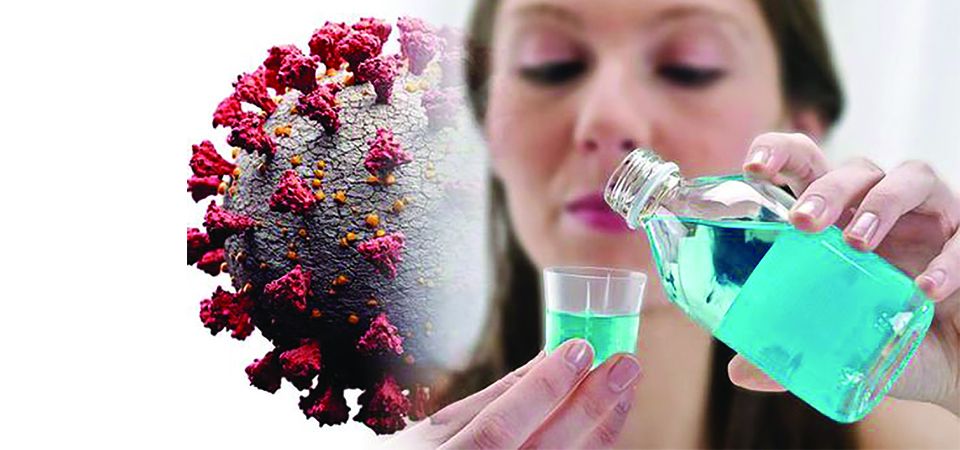Gargles Prevent COVID-19 Spread

Dr. Prakash Budhathoky
Oral and dental health care providers are considered to be at the highest risk of acquiring the infection because of prolonged face-to-face exposure to patients, exposure to respiratory secretions and aerosols produced during procedures like ultrasonic scaling and cavity/access preparation using a high-speed air rotor with water jet cooling systems.
Dental procedures causing splatters, fomites and aerosols can propel a high viral load in the procedure room thereby increasing the risk of cross-infection between dental practitioners, patients, in-between consecutive patients as well as dental auxiliary staff.
Recent observations have proven that salivary glands act as the reservoir virus for Active and live virus have been isolated from the saliva of patients who were asymptomatic or were considered free of the disease suggesting that COVID-19 transmitted by asymptomatic infection may originate from infected saliva.
Recent laboratory studies have shown that tubes of toothpaste containing zinc or stannous fluoride and mouthwash formulas with cetylpyridinium chloride (CPC) can effectively neutralize SARS-CoV-2, in reducing the amount of SARS-CoV-2 in the mouths of people who have COVID-19 and potentially slowing down the spread of the virus. Tubes of toothpaste were found to neutralize 99.9% of the virus after two minutes of contact Whereas Mouthwashes were effective after only 30 seconds.
Mouth Rinse
A critical review published in the Journal of Dental Research, evidence for various mouth rinses about their potential anti-SARS-CoV-2 activity. The review concluded that mouthwashes with antiviral ingredients could help decrease COVID-19 transmission by reducing viral loads in the mouths of infected patients when they cough, sneeze or speak. Antiviral mouthwash could help curb coronavirus transmission.
Mouth rinses containing chlorhexidine against SARS-CoV-2, chlorhexidine reduced the viral load post gargling for 2 hours, this decrease was transient and the viral load increased again. But it was found no significant decrease in SARS-CoV-2 intraoral viral load with 1% hydrogen peroxide mouth rinse in COVID-19 patients. SARS-CoV-2 resistance of compounds in garlic essential oil showed that 17 organo–sulfur compounds had strong interactions with the amino acids of SARS-CoV-2, thus predicting its antiviral effects.
Antiseptics
Povidone Iodine has been a widely used antiseptic for many decades. It has the broadest spectrum of antimicrobial action compared with other common antiseptics such as chlorhexidine with activity against Gram-positive and
Gram-negative bacteria, bacteria spores, fungi, protozoa and several viruses. The multimodal mechanisms of action, rapid onset of action, persistent effect, lack of reported resistance, and an excellent safety profile are other advantages of Povidone Iodine over other commonly available antiseptics.
BBC Medis also said Cardiff university study In Laboratory, Mouthwash containing cetylpyridinium chloride CPC can kill coronavirus within 30 sec. and is going on a clinical trial. It has to be finalised peer-reviewed and how long can one exposure works. Similarly, cannot be used in the respiratory tract and lungs, so can kill viruses in saliva but cannot be the treatment with COVID-19.
Povidine Iodine has been demonstrated to have greater antiviral activity against both enveloped and non–enveloped viruses as compared with other antiseptic agents, such as chlorhexidine. Povidine Iodine has also demonstrated In Laboratory activity against SARS-CoV and MERS-CoV.
In laboratory studies have demonstrated that mouth rinses containing povidone-iodine also have virucidal activity against SARS-CoV-2 after contact of 30 sec. Gargle and mouthwash containing it achieved ≥99.99 per cent virucidal activity against SARS-CoV-2. In a comparative study, thrice-daily gargling with Povidine Iodine for 30 seconds resulted in 100 per cent viral clearance as early as 4 days after the intervention in patients with confirmed Stage 1 Covid-19, which includes asymptomatic persons and the first two days of the illness. Viral clearance with essential oils was 80% and with tap water, it was 20%.
Everyone should be using these mouthwashes Regularly either by Self or Dentist Prescription. Because people either want freshness or want prevention of halitosis, gingivitis. In Dental Appointment, Three doses of antiviral mouthwash should be used the day before a meeting, and one dose the morning of the event. COVID-19 patients should be using mouthwash regularly for 7-10 days. Antiviral mouthwash could help curb coronavirus transmission.
Interim Guidance
Our government has endorsed interim Guidance for Dental Practices during COVID 19 Global emergency approved by Nepal Medical Council on 20th of Jestha 2077 and the Ministry of Health and Population on 9th of Shrawan 2077. As per this guideline, 1-min mouth rinse with 0.2 to 1 Percent povidone,0.05 to 0.1percent ethyl pyridinium chloride, or Fluoride containing mouthwash/ Gargle/ toothpaste.
Virucidal MouthWash or Gargle was made mandatory before any and every dental check-up and procedures For the safety of Professional and Cross Infection of Patients.
The toothpaste and mouthwashes containing Antimicrobial or Virucidal Content may help slow down the spread of SARS-CoV-2 by temporarily reducing the viral load in the mouth. While brushing and rinsing with these is not a treatment or a way to fully protect an individual from infection. they may help to reduce transmission and slow the spread of the virus, supplementing the benefit we get from wearing masks, social distancing and frequent hand-washing.”
(Chief of Eye, ENT and Oral Health of Department of Health Services, Dr Budhathoky is a Central Treasurer of Nepal Medical Association)
Recent News

Do not make expressions casting dout on election: EC
14 Apr, 2022
CM Bhatta says may New Year 2079 BS inspire positive thinking
14 Apr, 2022
Three new cases, 44 recoveries in 24 hours
14 Apr, 2022
689 climbers of 84 teams so far acquire permits for climbing various peaks this spring season
14 Apr, 2022
How the rising cost of living crisis is impacting Nepal
14 Apr, 2022
US military confirms an interstellar meteor collided with Earth
14 Apr, 2022
Valneva Covid vaccine approved for use in UK
14 Apr, 2022
Chair Prachanda highlights need of unity among Maoist, Communist forces
14 Apr, 2022
Ranbir Kapoor and Alia Bhatt: Bollywood toasts star couple on wedding
14 Apr, 2022
President Bhandari confers decorations (Photo Feature)
14 Apr, 2022










